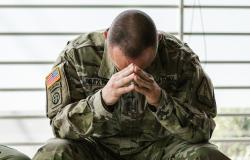Will America’s Military Save or Sink Democracy?

Mark Beeson explores the role of America’s military under Donald Trump and its implications for the wider world.
While the world has been transfixed by the convulsions in global financial markets and the upending of American foreign policy under Donald Trump, surprisingly little attention has been paid to what may prove to be an even more consequential development. Not only is the future of American democracy more uncertain than we might have imagined only a few months ago, but it’s possible that only the people Trump once called ‘my generals’ can save it.
Civil-military relations are normally the preserve of area specialists who study authoritarian regimes in Latin America, Asia and Africa. No longer. On the contrary, there is a growing list of prominent military figures in the US who are voicing their concerns about the future of the country under Trump’s increasingly authoritarian and unaccountable leadership. Given America’s historical role as a beacon of democracy, this can only encourage and legitimise authoritarians elsewhere.
The new American model
Trump’s chief of staff during his first term, John Kelly, was a former Marine general who had a chance to observe his leader at close quarters. His verdict? ‘Trump met the definition of a fascist, would govern like a dictator if allowed, and had no understanding of the Constitution or the concept of rule of law.’
The key question that arises is what will those still in uniform do in the all-too-likely event that Trump orders them to take action against ‘the enemy within’, otherwise known as political opponents fighting to preserve democracy, freedom of speech and individual liberty; the very constitutional order the military is pledged to defend, in fact.
Despite recent concern about the rise of China as a threat to American military supremacy, it remains the most powerful force in the world. Given the amount the US spends on equipping the military, it ought to be. It is not necessary to think that a military-industrial complex exercises an unhealthy influence over the content of government spending or grand strategy to recognise that the values that inform the behaviour of the armed forces and its leaders are likely to play a crucial role at moments of national crisis.
Traditionally such crises have been unambiguously the military variety, the quintessential example being World War 2, which fulfilled all the criteria for being a ‘just war’. This helps to explain the high esteem veterans were held in and their prominence of post-war life.
Significantly, they had all imbibed a set of values that revolved around an idea of ‘military professionalism’, which according to Samuel Huntington, meant that ‘the military function is performed by a public bureaucratised profession expert in the management of violence and responsible for the military security of the state.’
Huntington may be best known these days for the ‘clash of civilisations’, but it is hard to overstate the influence of The Soldier and the State. It has been required reading for aspiring members of the officer corps for decades, and it offers a model for both professional military behaviour and for the military’s collective relationship with civilian political power.
Huntington was writing at the height of the Cold War when American politics was far less polarised than it is today. Now, by contrast, not only have ‘military officers become increasingly partisan’, overwhelming identifying with the Republican Party, but so has the public, which views statements by politicians positively if they align with their own beliefs.
The Trump effect
Much critical attention has been given to the spectacularly under-qualified people who have been appointed to the Trump administration, whose principal claim to advancement seems to be either being excessively rich or sycophantic, but preferably both. The appointment of Pete Hegseth as Secretary of Defence is, ironically enough, one of the least defensible.
In a way that now seems oddly quaint and decidedly unrealistic, Huntington thought that the ‘stature of the office was determined by the stature of its secretaries’, who should have experience, the respect and admiration of an informed public, dedication, and ‘above all’, judgement.
Hegseth has, amongst other things, paid off someone he was accused of raping, been forced to step down from Veterans for Freedom because of claims of ‘financial mismanagement’, and chanting ‘kill all Muslims’ on one of many drunken outings. More recently, Hegseth texted details of a planned attack on Yemen to his wife and other members of a chat group.
If senior office holders in the Trump administration have no sense of self-discipline, public responsibility or morality, then it begs the question of who will defend the fabled foundations of the American way of governance or even democratic rule itself. A growing number of observers believe that the US is heading toward authoritarian rule under Trump’s ‘strongman’ leadership, which suits the 41% of Americans who believe that ‘having a strong leader who does not have to bother with parliament or elections’ is either a very good or fairly good system.
Trump is an admirer of other autocrats like Xi, Putin and even Adolf Hitler, who he claimed ‘did some good things’. Hungary’s Victor Orban has provided the most immediate roadmap for aspiring authoritarians like Trump, though. Significantly, Orban increased the defence budget by 30%, with experts claiming that ‘the militarisation of Hungary under Orban reflects his portrayal of the country as engaged in a “battle” against enemies ranging from Muslim migrants to liberal NGOs’.
This is, of course, precisely the sort of role Trump would like to see the security forces playing in America to deal with the ‘radical left’ and the sort of progressive political agenda he and his coterie of flunkies abhor. Even if many in the military disagree with the President’s commands they have little option but to obey as they can ‘resist only overtly illegal orders’. The danger is that ‘lawful but awful orders are more likely to emerge if presidents, emboldened by their own sense of impunity, increasingly test the limits of their power.’
Stress tests and their implications
Great crises provide great tests of even the greatest nations. The United States is not immune to such examinations, when the flaws and fault lines of political systems are brutally exposed with potentially catastrophic economic, political and even strategic consequences.
In Trump’s first term, the celebrated ‘adults in the room’, generally ex-military men, provided a check on an impulsive and inexperienced President. This time around, Trump’s team offers no such opposition. On the contrary, Hegseth has enthusiastically supported Trump’s desire to invoke the Insurrection Act of 1807, which would ‘allow Trump to deploy active-duty military members for law enforcement’.
In other words, the military would be drawn into partisan political conflict on the side of an increasingly authoritarian leader whether they wanted to be or not. Whatever personal beliefs individual members of the armed forces may have, their first obligation is to respect the chain of command which culminates in the President. In such circumstances, not only is it unlikely that the military would save democracy, but they may be actively involved in supressing its supporters.
All of which poses an enormous challenge for democratically-inclined Americans, as well as the many countries that depend on the US as an economic partner and strategic ally. Trump’s famously ‘transactional’ approach to policy means that other countries will inevitably find themselves in the metaphorical and even real firing line.
As even key allies in Europe and the Indo-Pacific are discovering, loyalty counts for nothing, and supposedly common, foundational values are no longer necessarily shared. Ukraine is the most obviously vulnerable country at present, but it is not impossible that Trump might do a deal with Xi Jinping over Taiwan. Indeed, America’s withdrawal from the Indo-Pacific and the creation of new spheres of influence under authoritarian powers in Russia, China and the US cannot be ruled out.
All of which means that issues that the ‘international community’ ought to be addressing - climate change, global inequality, pointless civil and interstate wars – continue to blight the lives of millions. Under such circumstances other countries must learn to live without the reassurance that America seemed to provide. It may mean learning to work more effectively with China and perhaps even Russia if it agrees to give up its ludicrous and destructive expansionist ambitions.
Not all of this is all Trump’s fault. If nothing else, he has revealed just how vulnerable the world is to nationalism, populism and revanchism – and incompetent leadership. For all their well-known fragilities and shortcomings, transnational institutions like the United Nations and especially the European Union remain the best hope for humanity – if they can be made more effective and even survive the current chaos.
It is no coincidence that both these institutions emerged from the ashes of World War 2. Let us hope it doesn’t take a third world war to remind us of their value.
Mark Beeson, Adjunct Professor, Australia-China Relations Institute, University of Technology Sydney.
Photo by RDNE Stock project


